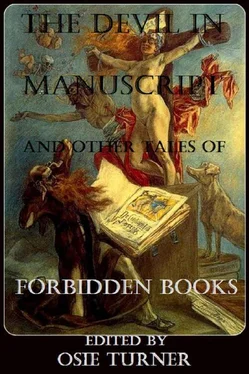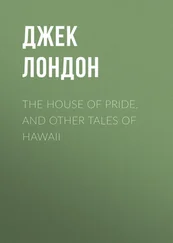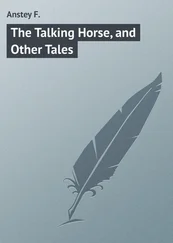“‘I must sever the last link which holds me to humanity,’ I told myself. ‘Paul must be sacrificed, as others have been sacrificed, on the funeral pyre of genius. Brave men have starved for it, shall I turn back? Kind men have forfeited their loved ones for it, shall I be weak? No, Paul, my dear friend, you must die!’”
Martin paused and passed his hand across his forehead. Great drops of perspiration had formed there, which at any moment threatened to run down into his eyes. Evidently the memory of these mental sufferings could still move him. I might have pitied the man, had I not had such a hearty detestation and horror of him.
“Three weeks later Paul and I went to the woods together,” he continued. “I had shipped a barrel of whisky to the camp several days before. It was child’s play for me to overcome your brother’s scruples and start him drinking again. For five days I kept him in a drunken stupor by passing him my flask when he showed signs of returning reason. On the sixth day I hid the barrel in the spring and refused to give him any more whisky. When he came to himself, he had an attack of violent melancholia,. Sick in body, he was sicker yet in mind.
“As you know, Paul’s fits of mental depression were rather dangerous. Before this he had always had someone to cheer him up, someone to drag him bodily out of the slough of despondency. But now I did just the opposite. Instead of trying to lighten his mind, I burdened it with all the weary weight of remorse. I gave him no hope to cling to. I told him that what had happened here in the woods would happen again and again; that there was no hope of ultimate cure for a drunkard; that he was predestined to die with delirium tremens. I even described his death rather vividly. I had always had a mental ascendancy over Paul; now I used this ascendancy as a weapon to destroy him. When I left him by the camp fire that night, I knew that the thought of immediate suicide was implanted in his whisky soaked brain.
“But how I suffered as I lay in the dark cabin waiting for the end! All my other sufferings were as nothing compared to this. When I finally saw his hand slide silently in through the doorway and clutch the barrel of a shotgun which stood against the wall, I seized the sides of my bunk and literally held myself down. ‘Only a moment now,’ I told myself. ‘Only a moment!’
“And then, when I heard the loud report of the gun, something seemed to snap in my brain—some chord of feeling which, having parted, left me as cold as ice. Since that day I have felt nothing—neither love nor pity, fear nor hate. Strange, isn’t it, Smithers? What was it that died with Paul? Whatever it was, it left me free to go my own way.”
“Your way shall lead to the gallows if I once get out of here alive!” I cried defiantly. “You’d better murder me now and have done with it!”
“I doubt if the courts would hold me responsible for your brother’s death,” he said quite calmly. “Crimes committed by the mind are beyond the reach of the law. However, hear me out, Smithers, and you’ll have ironbound proof.
“After Paul’s death, I began creating material for my new book. Patiently, cleverly, I arranged a murder in which I played the chief role and did the actual killing with my own hand. I committed that crime, calmly, coolly, without the slightest compunction. The description of it appeared in ‘The Confessions of Constantine.’ That book, if you remember, described my sensations—the sensations of the murderer—in the most minute and realistic fashion.
“During the next three days I committed twelve murders in all. I limited myself to that number because I was not actuated by a love for shedding blood alone. Ah, no, I destroyed life merely for art’s sake. And I naturally refrained from wholesale slaughter, as I feared that my sensations would soon become dulled by over usage and that I would no longer be able to record them so vividly and with such artistic feeling. In a word, I fostered my talent.
“Soon after ‘The Confessions of Constantine’ was published, I began to read the papers with avidity. But I never turned to the literary sheet—the book reviews. I was tired of words; I wanted deeds. And I was not disappointed, as you know. ‘The Confessions of Constantine’ passed the supreme test; it was responsible for a wave of crime that swept the country from end to end. This was a triumph for art. I not only appealed to the minds of my readers; I conquered their minds. I was the maker of men’s destinies, the angel of death.
“What exultation filled me during those few short months when ‘The Confessions of Constantine’ wandered through the world and whispered its red secrets to all mankind! How I gloated over this signal victory—a victory which no other artist had accomplished. Surely I was destined to dwell forever on the sunlit heights of great achievement. And then, just as the world seemed mine to play with at will, the roof of the heavens fell on my proudly lifted head. You know what happened, Smithers. ‘The Confessions of Constantine’ was condemned by the government!
“I made inquiries and soon learned who was responsible for my downfall. I did not underestimate Wilbur Huntington for an instant. The man was a brilliant psychologist and capable of doing big things as a criminal expert. He had already traced the crime-wave to ‘The Confessions of Constantine,’ would he not soon compare it with ‘Many Murders’ and make some startling deduction? Suppose he should learn that I had no imagination? Would I be safe?
“Thoughts such as these, prompted me to write that letter which he received in your studio. Before he came that night, I made my preparations. Securing the services of three murderers who could be relied upon, I hid them behind the portieres in my apartment. No sooner was he well inside, before they leaped upon him and pinioned his arms behind his back. He was helpless.
“‘So you decided to get me out of the way, Martin,’ he said with surprising calmness. ‘I thought it might come to this.’
“In spite of the great wrong the man had done me, I could not help showing him a certain amount of respect. There he stood, with a boyish smile on his face, while those assassins were nearly tearing his arms out of their sockets. He seemed as careless to pain as he was to death. Your friend cut an heroic figure, Smithers.
“‘You are quick to see the truth,’ I said. ‘If you wished to live, you should not have treated a great book in such a manner. It may be years before I can write another equally as good.’
“‘That’s what I came to see you about—your art!’ he cried with strange enthusiasm. ‘You’re going to kill me immediately, I presume?’
“‘Most certainly,’ I answered. ‘I never waste time when I am anxious to be at work.’
“‘Then hear me first,’ he broke in excitedly. ‘I want to speak of your work.’
“‘Well?’ I asked.
“‘You have described crime from the standpoint of the onlooker and from the standpoint of the assassin,’ he said. ‘That is true, is it not?’
“‘Yes,’ I assented.
“‘But you have missed the great situation—the truly artistic situation!’ he continued quickly.
“‘How so?’ I demanded hotly.
“‘Why, you have never written a story from the standpoint of the victim!’ he cried. ‘In other words, what is the exact sensation of death?’
“‘What is the exact sensation of death?’ I repeated dully.
“‘To be sure!’ he shouted almost gleefully. ‘You’re worse than a failure, Martin, for you are only a partial success! You, whom they call the recorder of sensations, have missed the only unknown sensation—that mysterious sensation of death! There is material beyond your reach. Till you have mastered it, you will remain a living lie. I will know that secret, but it will not be mirrored in my dead eyes! You will have to go further, Martin—further!’
Читать дальше












